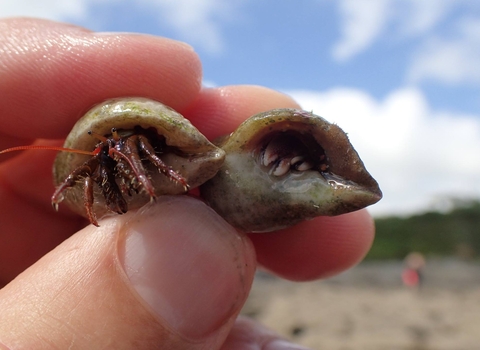What is Shoresearch?
Shoresearch is a user-friendly and fun method of exploring the shore and recording the species and habitats found there. Shoresearch Cornwall has been run by Cornwall Wildlife Trust since 2012 and in this time we have carried out hundreds of surveys and have trained over 200 volunteers.
Cornwall Wildlife Trust provide Shoresearch training at specific events and on each survey. Volunteers are welcome to come along to organised events but are also encouraged to carry out their own Shoresearch surveys and to send in their findings.
Shoresearch are currently training up local marine groups all across Cornwall to run their own Shoresearch surveys using the new Shoresearch app. To find out if you can get involved, contact your local marine conservation group by finding them on social media. There is also the Your Shore Network facebook group which you can join to keep up-to-date with everything happening with the marine groups across Cornwall.
Shoresearch Cornwall Promo (https://youtu.be/mlHwyi4H388)
This film was made by Thomas Daguerre, Shoresearch volunteer and founder of Hydro-Motion Media CIC
Visit the Shoresearch Facebook page
We use our Facebook page to share news, fascinating facts and details of events. We also love it when people post photos of creatures or plants found on Cornish shores that they would like help identifying! To keep up to date with the project and upcoming surveys, join the Shoresearch mailing list.
Shoresearch Week
This year, our incredible volunteers were out and about surveying Cornwall's rocky shore for our annual Shoresearch Week! Our volunteers visit the original five groups that made up the Your Shore Network - Helford, Polzeath, St Agnes, Looe and Fowey, which make up five of Cornwall’s Voluntary Marine Conservation Areas (VMCAs). Watch this space for the 2024 program to join Shoresearch Week 2024
Download the Shoresearch Week 2022 Report
Watch the video to learn more about our Shoresearch Week volunteers:
How does it work?
We use four different survey methods. Not all are used at every survey but we always try to incorporate a walkover survey which is the best fun!
Timed Species Search
A twenty minute search of an area of shore looking for a small number of key species. Using photo cards. This method creates useful, comparable data. (submitted to Marine Biology Association Shore Thing project)
Walkover Survey
A targeted, informal search of an area of the shore with particular interest (usually the lower shore). All findings get recorded. (You can carry one of these out yourself see details further down this page!)
Biotope Transect Survey
This is carried out when monitoring over a long time scale. We take a tape measure and walking from the low water to high water mark we record the position of biological zones across the shore.
What do we do?
Whilst surveying we fill in a Shoresearch recording form and photograph habitats and species found. It is also important to use a GPS to pinpoint the position of transects and significant finds. When we’ve finished on the shore, usually in about 2 - 3 hours, we gather together afterwards to make sure that we have recorded a full list of all the species seen, linked to the main habitat types in which they were found, and with an estimate of their abundance. A Dropbox account is being used by the volunteers and Wildlife Trust Staff to share photos, records and useful resources.
Once trained Shoresearchers are encouraged to carry out their own surveys to help us gather as much data as possible. Instructions and recording forms are downloadable at the bottom of this page.
What happens to the information collected?
All the records gathered by Shoresearch will be made available for all by the Environmental Records Centre for Cornwall and the Isles of Scilly (ERCCIS). The information helps us monitor change on the shore and provides biological information to counter potential threats. It has been particularly useful in gathering information on areas being considered as Marine Conservation Zones by the government in recent years and will be vital in monitoring these areas in future.
We are also very lucky that a number of our Shoresearchers are incredibly knowledgeable about a wide range of plants and animals, and are always happy to help others learn on the shore.
Who can take part?
Anyone and everyone! If you are keen to learn and happy to give up a few hours of your time you are welcome. Prior knowledge of marine life is not necessary, but it is still great for those that do already have a good level of knowledge. The shore can be slippery and hard to access so you do need to be fit and mobile to take part. We also ask that under 18s are accompanied by an adult.
Matt Slater says:
"Shoresearch surveys are fun and interesting and a great opportunity to meet like minded people.
It is incredible how diverse the marine life is on our shores and exploring in a larger group means that you are pretty much guaranteed to find something new every time! Our volunteer team are really enthusiastic and the method we use is very user friendly and appeals to people with a wide range of experience and skills!".

